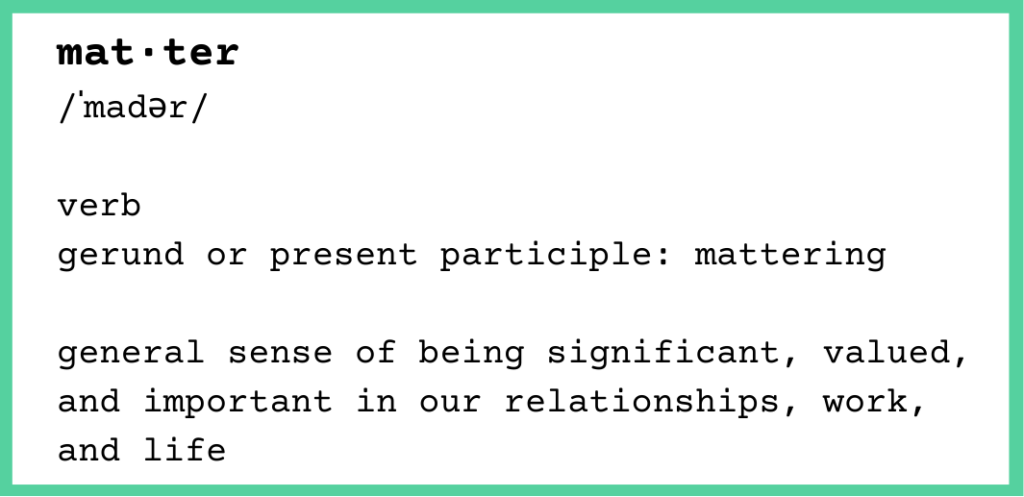by Lizzie Pollock, Partner, Team Effectiveness
When was the last time you felt like you mattered at work?
Maybe your manager made a point to acknowledge not only a contribution you made, but how your unique approach to that contribution made all the difference.
Maybe you were out sick and had to miss a team meeting, and your colleagues let you know that they missed the insightful questions you always bring to discussions.
Maybe your company rolled out a new wellness program that demonstrated that they care about employees’ health and lives outside of work.
For me, one of the most recent, powerful examples of feeling like I mattered at work was, ironically, when the CEO of LEAD3R, Dane Groeneveld, asked me to start looking into this concept of mattering in the workplace. Dane knew I was itching for a new project and love the opportunity to research and analyze interesting ideas. Being asked to investigate this concept made me feel seen, appreciated for my personal strengths, and important.

Mattering is defined most simply as feeling valued and adding value.
Key elements include:
- Your role is clear, and you know how your work contributes to your team and your organization
- Leaders in your organization (including your manager) notice you and acknowledge your contributions
- Your organization cares about your well-being
- You feel connected to the mission, purpose, and values of your organization
The Business Case for Mattering
Feeling like you matter at work isn’t just a nice feeling. It translates into impact and performance. A 2019 study published in the Journal of Positive Psychology found that employees who feel like they matter to their organization “are more satisfied with their jobs and life, more likely to occupy leadership positions, more likely to be rewarded and promoted, and less likely to quit.”
Research also suggests that people who feel like they matter have higher levels of self-efficacy – the belief in their capacity to achieve their goals – and that lack of mattering is associated with burnout, anxiety, and depression.
Mattering in an Era of Workplace Transformation
As our national conversation about Diversity, Equity, Inclusion, and Belonging swirls, we at LEAD3R fear that leaders and organizations will lose sight of the point of workplace DEIB efforts in the first place: to create organizations where all people can thrive and where people are valued for and have opportunities to leverage their unique backgrounds, experiences, and contributions – in other words, mattering-rich organizations.
These are the organizations that are filled with people and teams who come to work every day with a deep sense of commitment and belief in their ability to win, who support one another to accomplish goals, and who stay resilient in the face of challenges.
Cultivating a Culture of Mattering
Leaders can foster this culture by regularly acknowledging team members’ contributions and including diverse voices in decision-making processes.
Colleagues support each other’s sense of mattering by actively collaborating and seeking out one another’s expertise and ideas. Even small actions like following up on personal details shared by coworkers or initiating regular team check-ins focused on wellbeing can significantly impact how valued people feel.
Organizations that continually connect the dots between individual roles and the company’s broader mission and goals help employees see their work’s purpose and importance.
By consistently calling in unique talents, celebrating achievements, and creating opportunities for growth and mentorship, workplaces can build an environment where everyone feels essential to the team’s success and experiences the profound benefits of mattering.
These steps are small – and they matter.
To learn more about fostering a culture of mattering in your organization, please reach out to Lizzie directly.
Additional Resources:



